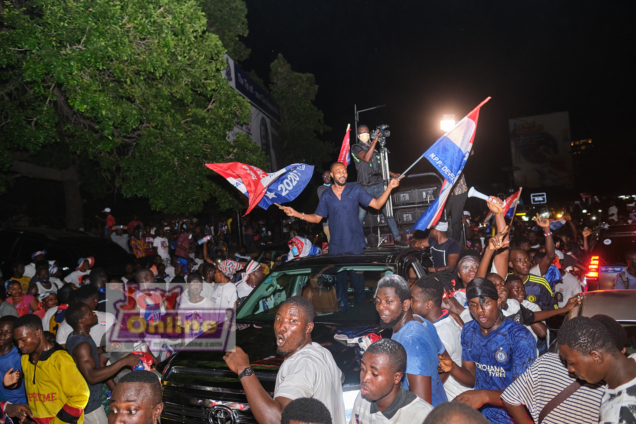The New Patriotic Party (NPP) has finally been declared the winner of the 2020 Presidential election. The victory, while resounding, offers the opportunity for the elephant fraternity to rethink its internal and external strategies for future elections, especially 2024 general election.
The seemingly even distribution of power between the party and the National Democratic Congress (NDC) in the eighth parliament of Ghana, clearly demonstrates the urgent need for the party to redefine and remodel its political strategies.
Most importantly, the reduction in the NPP’s margin in the Ashanti and Eastern regions in particular, depicts an increasing apathy in the party’s stronghold.
Indeed, except the Adansi Asokwa constituency where the NPP made significant gains in the number of votes (about 5%), there were outright reductions in the numbers polled by the party in its stronghold.
For instance, in 2016, NPP got 76.3% in Ashanti region but declined to 71.6% in 2020. Surprisingly, the NDC magically polled appreciable number of votes (26.1%), which is higher than its 2016 share (23%) within NPP’S stronghold. Similar trends were observed in Eastern region too.
These happenings in the 2020 elections, in general and Ashanti region in particular, require urgent attention on the part of the party leaders, to remedy the situation and find lasting solutions, capable of ensuring the party’s victory in the next election.
One would argue that the turn out in the region may account for the declining votes of the elephant party. While this argument may hold true to some extent, it is nullified by the increase in the number of votes of the NDC.
There is clear evidence of apathy among party members in the region and especially at the grassroots, as evidenced by the declining voting trend across the region. Multiple factors may account for the declining performance of the party in the region in particular, and the country at large.
Incidences of monetization of the party’s primaries largely contributed to the outcome of the election. It is important to note that, delegates alone do not make up the voting population within the party. Hence, if candidates maneuver their way in the primaries through payment of huge sums of money to delegates, it may not automatically seal their victory in the general election.
Monetization of primaries is further heightened by the imposition of candidates on party members by high ranking members of the party at the constituency, regional and national levels. In some instances, there was resistance from party members in certain constituencies, who threatened to vote skirt and blouse, should candidates be imposed on them from above.
This should have sent a clear and strong signal to the party leaders, to listen to the voice of the people, whose votes are critical to the party’s victory. However, the more powerful forces in the party callously ignored the sentiments of the people, who, without doubt, were indeed the deciders of the outcome of the presidential and parliamentary elections for the party.
Another contributing factor is the observable complacency among some of the party’s leadership including Members of Parliament, regional and local executives. Without doubt, the policies and programmes of the Akufo Addo-led government, especially free SHS, gained popularity among the larger section of the society.
However, some of them had preconceived notion that the popularity of free SHS and the party’s dominance in the region, were enough grounds to seal and warrant their victory. Hence, their engagement and popularity at the constituency level declined, even prior to the election, while the NDC massively capitalized on that to increase their share of votes in the region.
As a stronghold of the NPP party, residents in the region and members of the party in particular, want to see a correlation between the party’s dominance and a corresponding increase in its developmental initiatives and projects in the region. This correlation, if observable, can cause an increase in the party’s dominance in the region while reducing apathy among party faithfuls.
However, there was mixed feelings among sections of party members who perceived that the region in general and their communities in particular, had been taken for granted by the party. Going forward, election 2024 must be won by the elephant fraternity and the sooner the party corrects its wrongs, the better for its victory.
Gaining a deeper understanding of these and other factors through field research at the grassroots will therefore be very critical.
-
Data source: https://ghanaelections.peacefmonline.com/pages/2020/
The author, Peter Asare-Nuamah, PhD is an independent researcher and social commentator.
E-mail: peterasarenuamah@yahoo.com
Latest Stories
-
CAF Confederation Cup: Dreams face Zamalek, RS Berkane take on holders, USM Algiers
2 hours -
PURC could have found a better approach to settle issues with ECG – Dr Manteaw
3 hours -
CAFCC: John Antwi sure of positive result against Zamalek
3 hours -
I’ll choose Osofo Kyiri Abosom as my running mate over Akua Donkor – Prophet Kumchacha
3 hours -
LPG prices surge in Ghana, raising concerns over tax impact
3 hours -
I commend PURC for taking courageous step to fine ECG board members – Kwame Pianim
4 hours -
Financing assurance secured from bilateral creditors to aid 2nd review funding for Ghana – IMF Africa head
4 hours -
Man who set himself on fire outside Trump’s Manhattan hush money trial dies
5 hours -
Fuel purchase issues have nothing to do with personal interest – Egypa Mercer
5 hours -
ISRQ2024: Theorose School wins Championship with 0.5 points, heads to Canada
5 hours -
Use your voice, talents, skills to advocate for positive change – UniMAC VC tells graduates
5 hours -
Livestream: Newsfile discusses ‘dumsor’, Ex-MASLOC CEO jail and Election 2024
5 hours -
Otumfuo STEM Festival launched to find problem-solvers, promote science education
5 hours -
Irene Logan ties the knot in colourful ceremony
5 hours -
Alliance with other parties, not a merger – Alan Kyerematen
6 hours

